Syria: who’s involved, and what do they want?
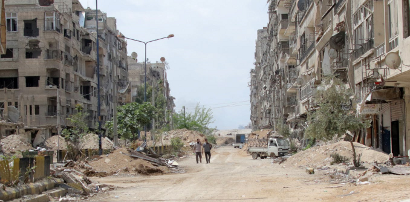
In the days since an alleged chemical attack outside Damascus, the pressure in Syria has risen dramatically. With outside powers launching missile strikes on Syrian ground targets as the Assad government’s backers warned them against it, here’s a rundown of who the major players are.
Bashar al-Assad
Scott Lucas, University of Birmingham
Among those glancing at Syria’s seven-year conflict, a simple but misleading declaration is circulating: “Assad is winning”. But the Assad regime has only survived because of the political, economic and military life support it’s had from Russia, Iran and Hezbollah. It is now entirely dependent on them.
And that’s for rule over just a part of Syria. The opposition, though very dependent on Turkish protection, holds much of the north-west, and it also – for now – controls territory in the south along the Jordanian border. Kurdish groups have taken much of northern and eastern Syria after pushing back the so-called Islamic State (IS).
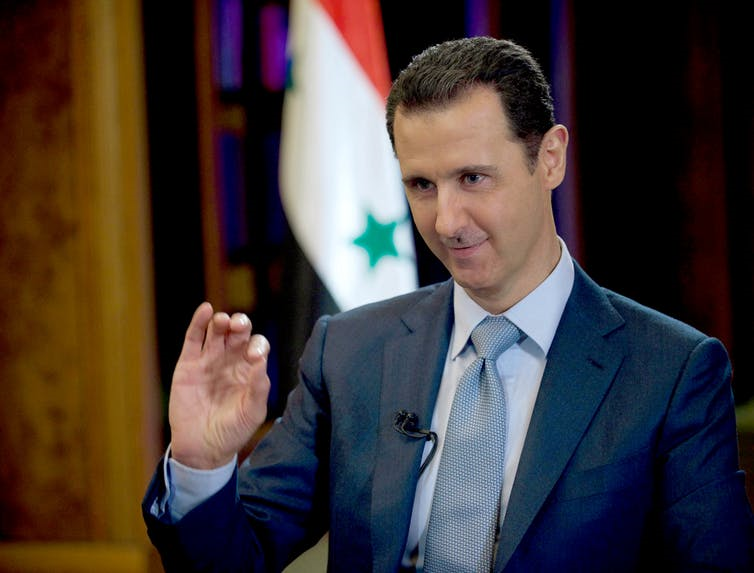
A president on permanent life support: Bashar al-Assad. EPA/SANA
Even within the areas it has regained, the regime’s hold is tenuous. It will have to contend with many civilians who won’t welcome its rule, and there is the prospect of an ongoing insurgency. In a country that’s lost 75% of its GDP, “reconstruction” is, for now, a pipe dream. Assad’s backers do not have the necessary resources for more than a subsistence recovery, and they are already looking for their share of what’s left of Syria’s economy.
With his Russian- and Iranian-backed military, his secret police and prisons, and his propaganda outlets, Assad will still pose as a president in his own right. But he does over a country which has lost more than 500,000 people to killing, at least 11m people to displacement, and the damaged hearts and minds of even more.
The US
Natasha Ezrow, University of Essex
The US’s approach to Syria is confusing and erratic. Throughout his campaign and well into his first year in office, Donald Trump claimed that he was “committed” to defeating IS, which still had a small presence in Syria at the time. Simultaneously, his administration pledged to pull out of Syria, with Trump criticising his predecessors for taking military action in the first place.

Donald Trump weighs his options. EPA/Jim Lo Scalzo
While Trump ordered limited strikes on Syria in April 2017 and disclosed that a total of 2,000 troops were in fact on the ground, the administration has overall not maintainted a strong presence in Syria. The contradictions have continued ever since: just a few weeks ago, it was reported that the Pentagon had plans to expand the number of troops – but Trump soon publicly remarked that US troops would be returning home “very soon”, leaving the military perplexed.
After the latest apparent chemical attack on civilians by the Assad regime (though Russia blamed the opposition for the attack), Trump sprung into action again and publicly castigated Russia. Trump first claimed that the US would be sending over missiles, taunting Russia with a series of tweets, before lamenting that the relationship between the US and Russia was at rock bottom. And now, a set of limited missile strikes in collaboration with US allies has targeted supposed chemical weapons productions and storage sites.
All in all, it’s unclear what direction the US will take next. And even as the military appears to want to expand its role, Trump’s preferences are still unpredictable in the extreme.
Russia
Moritz Pieper, University of Salford
Russia’s view of Syria is an instrumental one. In the UN Security Council, Russia has consistently vetoed resolutions that could repeat the Libyan intervention in 2011, when a no-fly zone was liberally interpreted to justify regime change.
Russia is not protecting Assad because of any significant economic or military ties, but for two other specific reasons. For one, Russia presents the integrity of Syrian governance structures as a bulwark against radical Islamist alternatives. But on another level, Russia’s military intervention has made it an unavoidable geopolitical interlocutor for the rest of the world.
Since September 2015, Assad’s fate has been tied even closer to Russian policy planning, and has forced the West to talk to Russia as a “Great Power”, one considered as much a shaper of the rules of international politics as the US.
Iran
Edward Wastnidge, The Open University
On first sight, Iran and Syria make strange bedfellows. One is perhaps the world’s preeminent theocracy, and the other a secular Arab-nationalist state – and yet their alliance is one of the most enduring in the Middle East. The two share a strategic outlook on key regional issues, not least the plight of the Palestinians. Together with Hezbollah in Lebanon, Iran and Syria form a self-declared “Axis of Resistance” meant to counter both Israel and the West’s aims in the Middle East.
Syria has historically acted as a key conduit for Iranian support to Hezbollah as it resists Israel from neighbouring Lebanon. That in turn means Iran vitally needs a friendly government in Damascus to safeguard its strategic clout in the region. Throughout the Syrian civil war, with Iran’s backing, Hezbollah has served alongside Iranian forces as a key Assad ally. And alongside their forces, Iran has helped corral volunteer fighters from across the Shia world to join the fight, initially as defenders of sacred Shia shrines.
Iran has been working with Russia and Turkey to establish de-escalation zones in Syria, but recent Israeli air strikes and the looming threat of Western action against Assad bring in the very real spectre of direct clashes – with Iran, Hezbollah, Syria and Russia on one side, and Western and Israeli forces on the other.
Turkey
Alpaslan Ozerdem, Coventry University
At the end of their trilateral Syrian summit on April 4, the leaders of Turkey, Syria and Iran put on a show of unity – but it was somewhat misleading. The three countries are still deeply divided over the Syrian war, and on what sort of peace they would want to see.
This was particularly visible when Iran’s president, Hassan Rouhani, moved that the Afrin District, captured by Turkey and the Syrian Free Army from Kurdish forces, should be handed back to the Assad regime. That view was shared by the Russian foreign minister, Sergey Lavrov – despite the fact that the operation to take Afrin, Operation Olive Branch, could only have been undertaken with Russia’s green light.
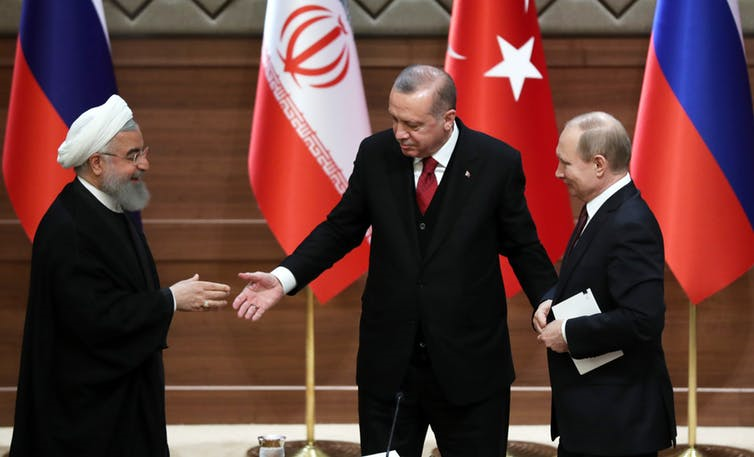
Caught in the middle: Turkey’s Recep Tayyip Erdoğan with Iranian president Hassan Rouhani and Russian president Vladimir Putin. EPA
This dissonance says a lot about Turkey’s precarious position in the Syrian conflict, which is necessarily defined by its relations with Iran and Russia. And while Donald Trump seems to be changing his mind on Syria on a daily basis, if he reverts to his recently stated intentions of withdrawing most US forces soon, that could make Turkey’s leverage against these two countries even weaker.
So long as both Iran and Russia work to secure their serious geopolitical interests in Syria’s future, Turkey’s position will remain very uncomfortable. Just as its relationship with the US over Syria is very tense these days, Turkey is realising that warm handshakes from Iran and Russia do not necessarily imply lasting alliances.
The Kurds
Cengiz Gunes, The Open University
A new US-led action against Assad could benefit or hurt the cause of Syria’s Kurds – but with the US’s long-term strategy so unclear, it’s hard to give a prognoisis yet.
The multi-ethnic, semi-autonomous Democratic Federation of Northern Syria (DFNS) has so far been getting military and diplomatic support from the US-led coalition, and that support will determine a lot about the Kurds’ future in Syria. Even as the ongoing Russian-led Astana peace process has the potential to sideline the Kurds altogether, a decisive US-led intervention could potentially weaken the Assad regime to the point where it felt more inclined to negotiate. It would also mean the Kurds could rely on the leverage of the US and France to secure a better deal for the DFNS.
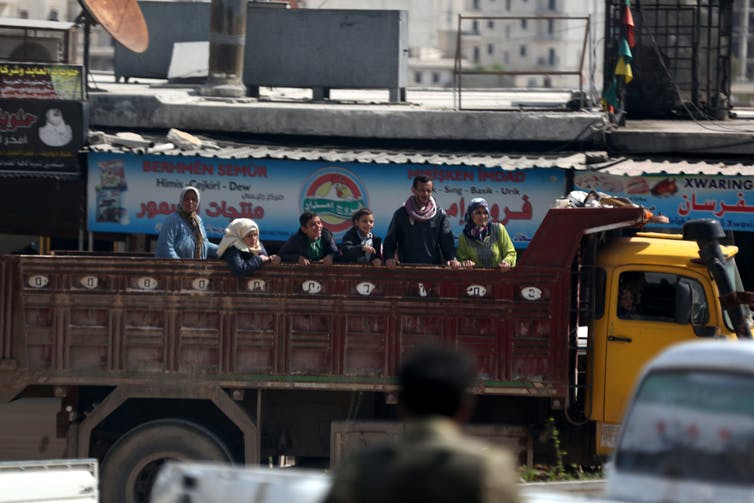
Civilians in the captured city of Afrin, northern Syria. EPA/Aref Tammawi
On the other hand, if the US attacks the regime without a strong commitment to see the conflict through to a resolution, Russia, Iran and the Assad government might be antagonised into targeting the Kurdish-led entity as an “enemy within”. In that scenario, Russia could even give the green light to Turkey to pursue its long-held objective of dismantling the Kurdish-led autonomous entity altogether, as it did with Turkey’s recent invasion of Afrin in northwest Syria.
The US-led coalition failed to strongly condemn Turkey’s capture of Afrin, and Trump has since hinted that the US will withdraw its forces from Syria “very soon”. That generated a huge amount of anxiety among the Kurdish leadership in Syria, and raised the spectre of their worst fear: that once the IS threat is completely eliminated, their crucial alliance with the US could come to an abrupt end.
Iraq
Balsam Mustafa, University of Birmingham
A US-led airstrike or intervention in Syria could profoundly affect the security inside Iraq. There is a real concern in Iraq that an escalation in Syria could create a dangerous security vacuum, strengthening the position of holdout IS militants who are already present near the Iraqi-Syrian border.
In his weekly press conference on April 10, the Iraqi prime minister, Haider al Abadi, stressed that Iraqi forces are doing their best to “secure all Iraqi lands” and that they are “currently conducting operations in desert areas”. He also revealed that he had spoken to Donald Trump to emphasise that measures maintained will be taken to defeat IS in eastern Syria, “in co-ordination with our partners including Russia and Syria”.
Israel
Beverley Milton-Edwards, Queen’s University Belfast
The Israeli government faces a growing security challenge on its southern border, where there are weekly protests by thousands of Palestinians in the Gaza Strip. But the more serious security concern is the country’s extremely tense northern border with Syria.
The Israeli government’s greatest fear is a dramatic regional escalation, and the possibility that Syria will become a theatre of open conflict between Russia and states like the US, UK and France. If the US responds to the chemical weapons attack in Douma with intense force, that might set off a domino effect that could draw Israel further into the fight – especially if Iran takes the Assad government’s side in response.
The NATO allies
Simon Smith, Staffordshire University
A US-led coalition has been operating against IS in both Syria and Iraq since 2014. It includes several NATO allies: Belgium, Canada, France, Germany, The Netherlands and the UK. NATO did not contribute to the latest airstrikes as an organisation – but they were carried out by US, the UK and France.
NATO countries have been holding active consultations on the situation in Syria after the chemical attack on Douma. At a press conference on April 12, NATO Secretary General Jens Stoltenberg stated that:
We condemn in the strongest terms the use of chemical weapons and call on the Syrian regime and its backers to allow full and unimpeded access to international medical assistance and international monitoring. NATO considers the use of chemical weapons a threat to international peace and security. And those responsible must be held accountable. We must do all we can to protect the ban on the use of chemical weapons.
But while this statement implies some semblance of unity between NATO members, the reality is that, while not on the scale of divisions caused by the Iraq war in 2003, Syria has truly split the alliance.
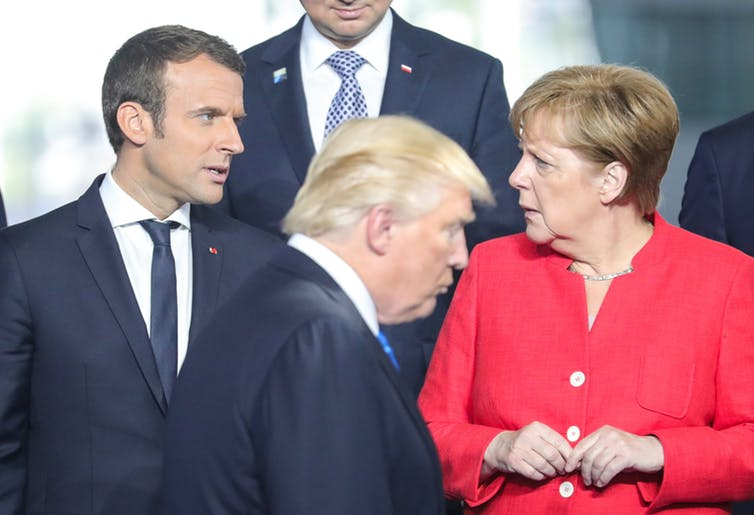
Waiting and watching: Emmanuel Macron and Angela Merkel. EPA/Armando Babani
Some of this stems from concerns that any missile attacks will lead to a wider conflict in the Middle East, and potentially between Russia and the West more broadly. But the war in Syria has driven rifts between specific allies as well, in particular between certain member states and Turkey.
At one stage, Turkey even revealed the positions of French troops and US bases in northeast Syria. Turkey’s president, Recep Tayyip Erdoğan, sharply criticised his French counterpart, Emmanuel Macron, for meeting Kurdish leaders in Paris and for offering to mediate between the SDF and Turkey. As far as Erdoğan’s concerned, that amounts to negotiating with terrorists.
 How other NATO members handle this is, for now, up in the air. But they are certainly feeling the pressure. As Angela Merkel said: “Germany will not take part in possible military action – I want to make clear again that there are no decisions – but we see, and support this, that everything is being done to send a signal that this use of chemical weapons is not acceptable.”
How other NATO members handle this is, for now, up in the air. But they are certainly feeling the pressure. As Angela Merkel said: “Germany will not take part in possible military action – I want to make clear again that there are no decisions – but we see, and support this, that everything is being done to send a signal that this use of chemical weapons is not acceptable.”
Scott Lucas, Professor of International Politics, University of Birmingham; Alpaslan Ozerdem, Professor of Peace-Building, Co-Director of Centre for Trust, Peace and Social Relations, Coventry University; Balsam Mustafa, PhD Candidate in Modern Languages & Politics, University of Birmingham; Beverley Milton-Edwards, Visiting Fellow, Brookings Doha Center and Professor of Politics, Queen's University Belfast; Cengiz Gunes, Associate Lecturer, Faculty of Social Science, The Open University; Edward Wastnidge, Lecturer in Politics and International Studies, The Open University; Moritz Pieper, Lecturer in International Relations, University of Salford; Natasha Ezrow, Senior Lecturer, University of Essex, and Simon J Smith, Lecturer in International Relations, Staffordshire University.
This article was originally published on The Conversation. Read the original article.
Contact our news team
For all out of hours enquiries, please telephone +44 (0)7901 515891
Contact detailsNews & articles

OU research model drives literacy transformation across São Paulo
A major state-wide literacy programme in Brazil is demonstrating how Open University research is informing public policy at scale, following its high profile presentation at BETT London 2026 by São Paulo’s Secretary of Education, Renato Feder.